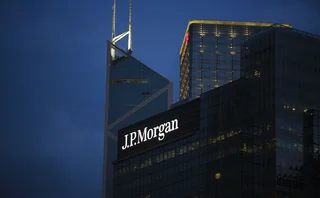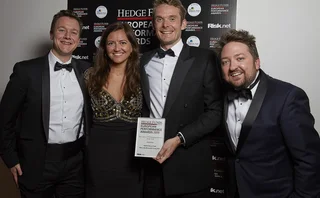
A war in Iraq could make capital preservation tricky
Disciplined risk management is key in current volatile market conditions
US long/short funds are performing well compared with their peers in other jurisdictions, but managers note the potential for war in Iraq poses a threat to capital preservation.
The overriding key to success in the current volatile market environment is disciplined risk management, according to Julian Wheeler, manager of Gulf International Bank's Falcon US Long/Short fund.
Wheeler has maintained the Falcon fund on a broadly neutral stance between long and short positions investing on the basis of fundamental analysis while seeking to unearth information the market has yet to discover.
The possibility of war in Iraq with extra defence spending, and a new tax package from the Bush administration, are events that recommend trading specific companies and could create opportunities.
'But markets have largely priced in a short conflict already,' Wheeler says.
Still, despite the geopolitical risk and volatility, the US remains less risky than other long/short markets, according to Wheeler, as it is a more mature market in long/short strategy funds with more money and more managers than Europe has.
'But if you are in a crowded market long or short, you could have a problem,' says Wheeler. He plans to continue to remain relatively market neutral due to market uncertainty.
'Get the Iraq situation out of the way and we might have more of an idea of where the market may head,' he says.
But the looming conflict is less daunting for many US managers than might be expected, according to Andrew Gibson, chief investment analyst at International Asset Management.
The past three years' bear market has seen a new breed of US long/short manager emerge, he says, managers taking the lion's share of profits on their portfolios' short book.
'This type of performance is filtering into a sizeable number of US long/short funds,' says Gibson. 'There is no question that US long/short compared to other regions is still more impressive.'
Many US managers have run almost fully invested throughout this difficult period, according to Gibson. 'European managers have less conviction in their ideas and are sitting on too much cash,' he says.
Many US firms are classic hedge fund boutiques with independent managers holding strong convictions running money themselves. They are not tied to banks or large investment management firms. The opposite is the case in Europe, Gibson contends, where very few managers are able to generate good returns on short positions. It will take three to four years before they can be compared to their US counterparts, he says.
'In Europe, managers are very reluctant to relinquish long-only obligations and often like the framework of a bigger investment management company,' he says.
'When we really look through the track record of the past three years, US long/short equity managers have definitely outperformed.'
Because US managers are generally in smaller boutique firms, generation of returns tends to be easier, he says. 'They do not need a committee meeting to go forward.'
This adaptability could extend if there is a war with Iraq, he adds, but in the longer term, regulatory changes could be less easy to find a way around.
David Hanna, manager of State Street's Long/Short Market Neutral fund also believes US managers are well placed to deal with increasing market volatility.
'From when I started 10 years ago. managers have developed processes to deal with the volatility. They have a better ability than in the past to react,' Hanna says.
The challenge in volatile markets for quantitative managers, is finding types of securities that are not consistently priced, he says, and this can favour short-term positions.
To reduce market risk he is more sector and beta neutral than he would be in normal market conditions.
'War with Iraq is by far the biggest risk facing asset managers,' he says. 'Any conflict will prove bad for managers as it takes time to reposition portfolios at inflexion points in the investment cycle.' While a short conflict, however, could prove positive if it ends uncertainty, Hanna adds that a protracted conflict would see markets less driven by fundamentals.
Only users who have a paid subscription or are part of a corporate subscription are able to print or copy content.
To access these options, along with all other subscription benefits, please contact info@risk.net or view our subscription options here: http://subscriptions.risk.net/subscribe
You are currently unable to print this content. Please contact info@risk.net to find out more.
You are currently unable to copy this content. Please contact info@risk.net to find out more.
Copyright Infopro Digital Limited. All rights reserved.
You may share this content using our article tools. Printing this content is for the sole use of the Authorised User (named subscriber), as outlined in our terms and conditions - https://www.infopro-insight.com/terms-conditions/insight-subscriptions/
If you would like to purchase additional rights please email info@risk.net
Copyright Infopro Digital Limited. All rights reserved.
You may share this content using our article tools. Copying this content is for the sole use of the Authorised User (named subscriber), as outlined in our terms and conditions - https://www.infopro-insight.com/terms-conditions/insight-subscriptions/
If you would like to purchase additional rights please email info@risk.net
More on Hedge funds
JP Morgan warns hedge funds to expect intraday margin calls
US bank may demand variation margin ‘up to seven’ times a day after Archegos default
Alternative markets give edge to Florin Court strategy
By concentrating on exotic and alternative markets, Florin Court Capital Fund has sidestepped overcrowding and correlation to the main trend following commodity trading advisers, offering investors a diversified alternative to the standard systemic macro…
Global macro views combine with quantitative models to produce consistent returns
The team behind River and Mercantile Group’s global macro strategy team operates under two key principles: that macro is the most important aspect of any investment decision and that decision-making should incorporate both systematic and discretionary…
On the offensive – Seeking a new edge, buy-side invests in portfolio and risk analytics
A fast-moving, headstrong hedge fund – hit by rare losses after a black swan event touched on an overweight country exposure – ponders adding fresh quantitative expertise. Much to traders’ chagrin, the chief investment officer and chief operating officer…
Esma backtracks on account segregation
Status quo protected for rehypothecation of collateral in tri-party, securities lending and prime brokerage
Redemptions focused within strategies suffering losses in 2016
Redemptions focused within strategies suffering losses in 2016
Hedge fund redemptions a dismal end to a bad year
Managed futures funds saw big inflows in 2016, but left investors disappointed
Larger funds are net losers as outflows continue
Managed futures funds have seen biggest redemptions for three years
Most read
- Top 10 operational risks for 2024
- Japanese megabanks shun internal models as FRTB bites
- Top 10 op risks: third parties stoke cyber risk






